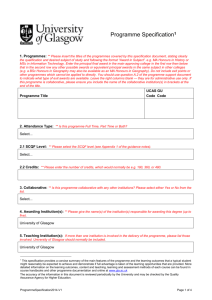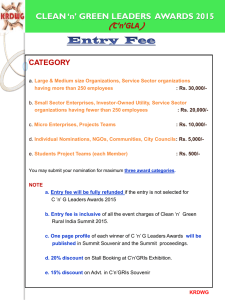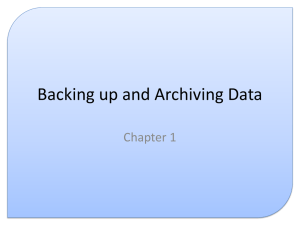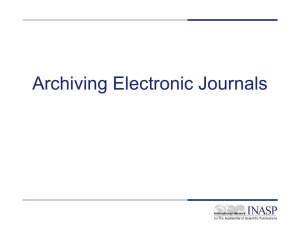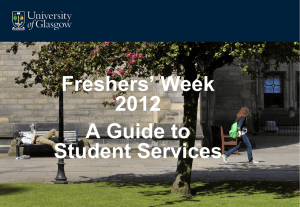Archiving your research data
advertisement
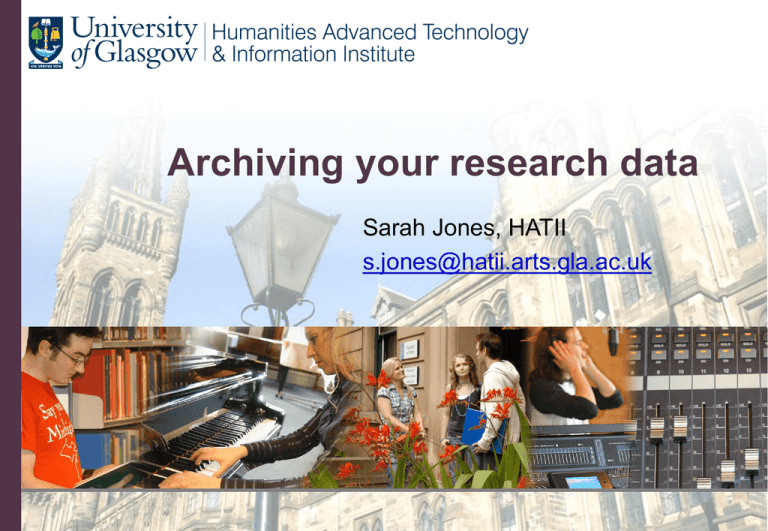
Archiving your research data Sarah Jones, HATII s.jones@hatii.arts.gla.ac.uk Why archive your data? (1) Drivers: OECD principles and guidelines for Access to Research Data from Public Funding: http://www.oecd.org/dataoecd/9/61/38500813.pdf RCUK statement on access to research outputs: http://www.rcuk.ac.uk/research/outputs/access/default.htm “publicly funded research must be made available to the public and remain accessible for future generations” Publisher requirements e.g. Nature’s policy on availability of data and materials: http://www.nature.com/authors/editorial_policies/availability.html “A condition of publication in a Nature journal is that authors are required to make materials, data and associated protocols promptly available to others without preconditions. “ Why archive your data? (2) Benefits: So you can continue to access and understand your data in the future To prevent loss or inaccessibility of valuable knowledge and data when funding expires or people move on So you can retrieve and share data if requested To allow data to be shared and combined in new and innovative ways “…because good research needs good data.” Glasgow’s Code of Good Practice in Research 2.3 Documenting results and storing data Researchers are required to keep clear and accurate records of the procedures followed and results obtained, including interim results. Data generated in the course of research must be kept securely in paper and/or an appropriate electronic format. The University expects such data to be securely held for a period of ten years after the completion of a research project, unless otherwise specified by the research funder or sponsor. Ref: University of Glasgow, Code of Good Practice in Research http://www.gla.ac.uk/media/media_46633_en.pdf Preparing to archive data Archiving is not the start! Researchers are involved in lots of activities that come before archiving and which influence what is kept, for how long and for what purpose. Ref: The DCC Curation Lifecycle Model, http://www.dcc.ac.uk/resources/curation-lifecycle-model Outline of the talk 1. Planning your research - data management and sharing plans - support at Glasgow 2. Creating your data - choosing software - developing procedures - documentation 3. Managing your data - storage and backup - access and security 4. Archiving your data Data management and sharing plans Ref: Overview of funders’ data policies http://www.dcc.ac.uk/resources/policy-and-legal/overview-funders-data-policies AHRC technical appendix Project Management of technical aspects - Management and reporting structure; timetable; deliverables; monitoring Data Development Methods - Content selection; chosen data/file formats; documentation; advice sought Infrastructural Support - Hardware / software; technical expertise; backup procedures Data preservation and sustainability - Preservation plans; advice sought; accessibility e.g. repository; sustainability Access - How you will make the resource accessible to the potential audience(s) Copyright and intellectual property issues - Advice sought; plans to address copyright / IPR issues Ref: Section of Je-S form BBSRC data sharing plan Data areas and data types Standards and metadata Relationship to other data available in public repositories Secondary use - further intended and/or foreseeable uses Methods for data sharing - e.g. deposit in public databases or access on request Proprietary data – restrictions on sharing to protect proprietary / patentable data Timeframes for public release of the data Format of the final dataset Ref: http://www.bbsrc.ac.uk/publications/policy/data_sharing_policy.pdf p6 ESRC data archiving questions 1. If the research involves data collection or acquisition, please indicate how existing datasets have been reviewed and state why currently available datasets are inadequate for this proposed research. 2. Will the research proposed in this application produce new datasets? 3. It is a requirement to offer data for archiving. If you envisage any difficulties in making data available for secondary research, please outline the difficulties. 4. Who are likely to be the potential users of the dataset? 5. Please outline the plans for and cost of preparing and documenting data for archiving to the standards required by the ESDS. Ref: http://www.esds.ac.uk/aandp/create/esrcfaq.asp MRC data sharing statement Type(s) of qualitative or quantitative data that will be generated Further intended and/or foreseeable research uses for the dataset(s) The distinctive added value that the new data would provide in relation to existing studies, databases or datasets in the same field Plans for preparing and documenting data for preservation and sharing Strategy for making data available, including timelines How data sharing would provide opportunities for coordination or collaboration The arrangements for governance of data collection and usage: management of consent, confidentiality, ethical and legal considerations and access rights. Any exceptional arrangements to protect intellectual property Ref: http://www.mrc.ac.uk/Ourresearch/Ethicsresearchguidance/ Datasharinginitiative/Policy/index.htm Wellcome Trust data plan Data quality and standards - Formats; conformance to community standards, interoperability with other datasets Use of public data repositories - Expectation of deposit into recognised public data repositories where possible Intellectual property - Justify proposed delays on data sharing due to IPR Protection of research participants - Explain limitations on data sharing to safeguard the privacy of research participants Long-term preservation and sustainability - clearly set out the long-term strategy for maintaining, curating and archiving data Ref: http://www.wellcome.ac.uk/About-us/Policy/Spotlight-issues/Datasharing/Data-management-and-sharing/WTX035045.htm Grant proposal support at Glasgow Local contacts to help with data plans and costings RDOs, research support, lab technicians computing services / Faculty IT Faculty ethics officers Research and Enterprise Grant support: http://www.gla.ac.uk/services/researchandenterprise/forstaff/ grantsupportandfundingsources/ IPR guidance: http://www.gla.ac.uk/services/researchandenterprise/forstaff/ knowledgeexchangeandtechnologytransfer/intellectualpropertymanagement/ Forthcoming: Data plan support through JISC Incremental project http://www.jisc.ac.uk/whatwedo/programmes/mrd/rdmi/incremental.aspx Progress 1. Planning your research - data management and sharing plans - support at Glasgow 2. Creating your data - choosing software - developing procedures - documentation 3. Managing your data - storage and backup - access and security 4. Archiving your data Creating data for archiving and reuse Considerations: Can you choose standards / formats etc that are more sustainable? What you want people to be able to do with the research data you are generating? What information will future users will need to understand the data – how will you make sure this is captured? Is there somewhere you can archive the data? If so, do they have requirements / minimum standards you need to meet? Key decisions at the creation stage What software will you use? - common, widely-used e.g. Microsoft office - proprietary, very specialist (potential licensing issues? ability to export?) - open-source software UKDA preferred formats: http://www.data-archive.ac.uk/sharing/acceptable.asp How will you create the data? - do you have a naming system e.g. initials and dates to link data to lab notebooks - how will you handle versioning so you know what’s most up-to-date? - where will data be stored? - what happens in exceptions e.g. if you need to work off the network JISC digital media file-name guidance: http://www.jiscdigitalmedia.ac.uk/crossmedia/ advice/choosing-a-file-name/ Metadata and documentation What information is needed to interpret the data? descriptions of all variables / fields and their values code labels, classification schema, abbreviations list details about how the data were created, analysed, anonymised information about the project and data creators tips on usage e.g. exceptions, quirks, questionable results Are there standards you can use? Dublin Core ISAD (G) DDI (Data Documentation Initiative) UKDA guidance on documentation: http://www.data-archive.ac.uk/sharing/metadata.asp Progress 1. Planning your research - data management and sharing plans - support at Glasgow 2. Creating your data - choosing software - developing procedures - documentation 3. Managing your data - storage and backup - access and security 4. Archiving your data Managing storage and backup Considerations: Is there a central place for your group’s data to be stored? Does everyone have sufficient space? If not, how is this resolved? Do people know who’s responsible for managing storage and backup? Options: Use central IT provision so storage management and backup is provided Manage own servers and backup facility departmentally Individuals manage own backup - how to automate so it’s more robust? e.g. use Apple Time Machine rather than burning CDs Access and security How are data accessed when you need to work remotely? Emailed back and forth? Copied onto memory stick? Secondary copy on laptop? Are there more secure options? NetStorage: secure, internet-based access to networked storage http://nwfiles.gla.ac.uk/NetStorage/ VPN (Virtual Private Network): a secure, encrypted connection to the University network. Download Cisco, the VPN client at: http://www.gla.ac.uk/services/it/forstaff/flexiblenetworkaccess/vpnclient/ Progress 1. Planning your research - data management and sharing plans - support at Glasgow 2. Creating your data - choosing software - developing procedures - documentation 3. Managing your data - storage and backup - access and security 4. Archiving your data And so to archiving… How to select what to keep? DP & FoI Office at Glasgow offer information audits to help you select data: http://www.gla.ac.uk/services/dpfoioffice/guidanceonrecordsandinformationmanagement/ informationaudits/ DCC’s basic overview to appraisal: http://www.dcc.ac.uk/resources/briefingpapers/introduction-curation/appraisal-and-selection Where to deposit? Enlighten – the University’s publications repository: http://eprints.gla.ac.uk/ The UK Data Archive (social science data): http://www.data-archive.ac.uk/ Archaeology Data Service: http://ads.ahds.ac.uk/ NERC data centres: http://www.nerc.ac.uk/research/sites/data/ NCBI GenBank (genetic sequence data): http://www.ncbi.nlm.nih.gov/genbank/ Future support Steve Beaumont chairs the Digital Preservation Advisory Board, which is looking at preservation needs across the University, specifically in terms of research data management JISC funded Incremental project on research data management - webpages to collate University guidance and links to support - tailored assistance on writing data management plans - example data plans and guidance on costing support - best practice guides and case studies - training courses on managing data, especially for PhDs and ECRs Tell us what you need! Useful contacts at Glasgow Don’t try to do things alone - ask for advice. Speak to: Local IT / research support technicians HATII (digital preservation expertise) - http://www.gla.ac.uk/hatii/ Research & Enterprise - http://www.gla.ac.uk/services/researchandenterprise/ Enlighten (the Uni repository) - http://eprints.gla.ac.uk/ Data Protection and FoI Office - http://www.gla.ac.uk/services/dpfoioffice/ Glasgow training courses: “Curation for Researchers” “Managing Research Data and Records” Training courses to come as part of Incremental Useful external guides DCC data management and sharing plan guidance: http://www.dcc.ac.uk/resources/policy-and-legal/data-management-plans JISC briefing paper on digital preservation: http://www.jisc.ac.uk/media/documents/publications/digitalpreservationbp.pdf THE supplement, The data revolution: http://www.nxtbook.com/nxteu/tsl/jisc/#/0 UKDA managing and sharing data guide: http://www.data-archive.ac.uk/news/publications/managingsharing.pdf Key message: In order to archive your data, ideally you should plan and cost this in from the outset Thanks! Any questions? Contact us at: sarah.jones@hatii.arts.gla.ac.uk http://www.gla.ac.uk/departments/hatii/
